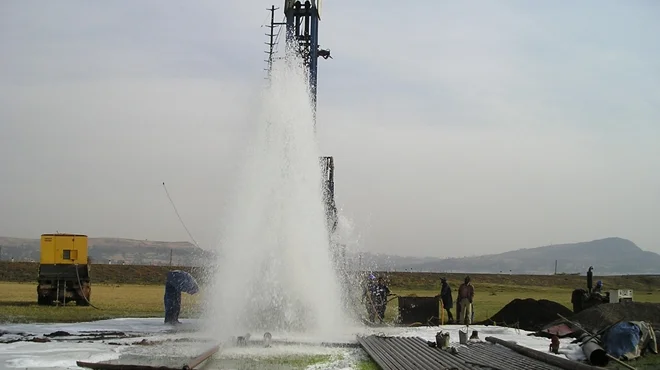The crippling draught that currently grips South Africa and the Western Cape region in particular has generally negative consequences for food producers, livestock, industry and the economy.
Water, so often just taken for granted when we turn on a tap, is our lifeblood and the one thing all living creatures cannot do without.
But while drought brings hardship – extreme in some cases – it also has a silver lining for those involved in groundwater drilling – that is in developing boreholes and well points.
Security of a water resource has been brought into sharp focus in recent years particularly in the Cape region. During the 2008 / 2009 drought in the southern Cape, towns like Sedgefield actually ran out of water causing authorities to invest in emergency schemes and costly desalination plants, many of which are idle during times of abundant rainfall.
Against a background of diminishing mains supply, restrictions, increased tariffs and possible fines, more affluent residents are calling in the drillers to secure this precious but not limitless resource from underground.
The appearance of a drilling rig in the up market eco estate of Atlantic Beach in Melkbosstrand caused a flurry of activity and good business for one such driller – Cape Drilling. A family owned business that has spanned four generations of the Moore family since its establishment in 1890 when Scottish driller Harry Peter Moore arrived as an army conscript during the first Anglo Boer War, and established a drilling business.
Currently run by father Deon and his two sons Ruan and Deon Jnr, Cape Drilling is based in Malmesbury and operates all over the western Cape region providing respite for farmers, authorities and residents alike.
Recent activity in Atlantic Beach estate has seen more than 10 boreholes being drilled, from 25m to 90m deep, providing yields of 40,000 – 66,000 litres/hour of sweet generally potable water for parched gardens and in some cases for household consumption.
Typical installations involve sinking the borehole is a location determined by the time honoured divining method, but rather than use an forked stick, a ‘mysterious’ twisted pvc cable appears to react in a similar way to the forked stick when groundwater is detected. While the science of such methods is difficult to prove, the results are an overwhelming certainty for residents at Atlantic Beach.
Borehole drilling is a noisy, messy operation that irks some residents in this pristine suburb, but is seen as a necessary evil that only involves inconvenience for a couple of days, then after the equipping phase is completed – water!
Equipping
Equipping involves placing the borehole pump, laying and connecting piping and power supply, installing a storage tank, booster pump and control system, and generally connecting into an established irrigation system.
As might be expected, the Moore’s have got this down to a fine art with residents receiving water in just a couple of noisy, intense days.
The volume of storage depends upon the anticipated usage, size of irrigated land and whether the ‘reservoir’ will provide for household use as well as irrigation. Household use will depend of the size of family and usage habits.
“A 1 000 litre capacity tank should be the absolute minimum” says Ruan “and a 5 000 litre will be suitable for larger properties and/or large family usage. Tanks come is a variety of shapes and sizes and can be mounted at ground level or concealed underground depending upon resident’s preference and site conditions” he explained.
“As the borehole pump is used to fill the tank, it is not advisable to have too small a tank as the larger borehole pump will be constantly refilling as the water delivered by the smaller capacity booster pump is used. Frequent operation has an effect on the pump’s life expectancy and running costs, although a factor, it is generally not significant and is offset by the saving in the tariff of mains water” said Ruan.
Operating and maintenance
“Cost of electricity and the pumping time will provide a cost of operation. A 1.1kW booster pump will cost about R2.50/hour to run but that will deliver far more water than the average garden needs even during the dry season. Thirty minutes of watering per day will therefore cost about R1.25, plus the tank ‘top-up’ of the borehole pump will be about the same, depending upon tank size.
“Sinking of the borehole and equipping involves a large capital cost for the average home owner and today runs at about R600 – R800 per metre drilled and equipping – depending upon tank and pump size and site conditions, from about R35 000. Adding this cost to the average mortgage bond could cost an additional R900/month at current interest rates” he said.
Maintenance said Ruan, is minimal as modern pumping equipment is robust and very reliable but a routine yearly inspection is recommended.
Inexhaustible supply?
Much has been broadcast recently about the existence of a giant L – shaped aquifer that is said to stretch from Veredenburg, to the east of Saldanha Bay, as far as Port Elizabeth and locally known as the Table Mountain Aquifer. Melkbosstrand appears to lie within this water rich band and according to the Moore’s, the Melkbosstrand area has plentiful sweet water resources.
Authorities are carrying out test drilling at a number of sites to establish the actual size and extent of the aquifer, its capacity and origins of supply, before larger scale exploitation can be considered.
Deon Snr explained that as dams are placed in water catchments the amount of runoff water available to recharge underground aquifers had declined. Indiscriminate discharge of ‘grey water’ and untreated sewage also pollutes the underground resources, he explained. A policy of sustainability needs to be made mandatory to protect underground resources such as recharging aquifers through stormwater harvesting.
What is clear though, not just for the Cape Town region, is that it is no longer sustainable to rely solely on surface water resources to supply a growing economy and a burgeoning population. The answer is a combination of surface water storage, ground water extraction (where possible) and most importantly wastewater reuse. In some cases seawater desalination might be an option.
Perhaps it’s time we take a leaf out of the Windhoek Municipality’s book where they have been reusing treated effluent and actually recharging their underground aquifer for more than 30 years! Perhaps that is why the beer tastes so good!















